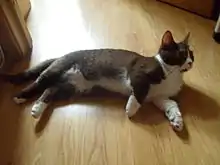Dwarf cat
A dwarf cat is any domestic cat which has the condition of dwarfism due to a genetic mutation. Unlike undersized cats of normal proportions, dwarf cats display symptoms of osteochondrodysplasia—genetic disorders of bone and cartilage, typically manifested as noticeably short legs.[1]

Since the mid-twentieth century, cat breeds with embedded dwarfism have been developed for sale. The ethics of their selective breeding is hotly debated, and many countries prohibit it as cruelty to animals.
Characteristics
The term "dwarf cat" is incorrectly applied to cats such as Toy and Teacup Persians which, though small, are breeds of normal feline proportions.[2] True dwarf cats are chondrodysplastic and have much shorter and thicker legs. Typically, half of a dwarf cat litter are non-dwarves born with normal leg length.
Breeds
The Munchkin is the original breed of dwarf cats. The International Cat Association (TICA) gave recognition to the Munchkin as a breed in 1994,[3] along with a Persian–Munchkin hybrid, the Minuet.[4] Other proposed breeds like the Skookum and Bambino have not been given recognition, although a Sphynx–Munchkin hybrid, the Minskin, is under study.[5] Four other breeds include the Lambkin and the Kinkalow, the Genetta and the Scottish Kilt.
Recognition and controversy
Unlike TICA, most cat registries and pet associations do not recognize any dwarf cat as a legitimate breed. The animals are excluded from most major pet shows and contests. Largely an American phenomenon, they are not widely accepted outside of the United States. In its registration rules, the Fédération Internationale Féline prohibits breeds based on dwarfism, and specifically mentions the Munchkin as an example of unacceptable manipulation of "genetic disease".[6] They are effectively banned under the European Convention for the Protection of Pet Animals and have been strongly condemned in the British magazine Cat World. In the US itself, the ASPCA admonishes its supporters to "stay vigilant" against the small but spreading market.[7]
See also
References
- Khuly, P. "Why I Can't Stand the Hype Over Dwarf Cats". vetstreet.com. Vetstreet. Retrieved 3 March 2014.
- "DWARF, MIDGET AND MINIATURE CATS (TEACUP CATS)". Retrieved 30 October 2014.
- "Munchkin breed introduction". Tica.org. TICA, Inc. 2013. Archived from the original on 13 December 2013. Retrieved 12 December 2013.
- "Napoleon breed introduction". Tica.org. TICA, Inc. 2013. Archived from the original on 13 December 2013. Retrieved 12 December 2013.
- "Minskin breed introduction". Tica.org. TICA, Inc. 2013. Archived from the original on 13 December 2013. Retrieved 12 December 2013.
- Breeding and Registration Rules: 2.7.3 Genetic Diseases. Fédération Internationale Feline
- "Cat History". Aspca.org. ASPCA. 2013. Retrieved 13 December 2013.